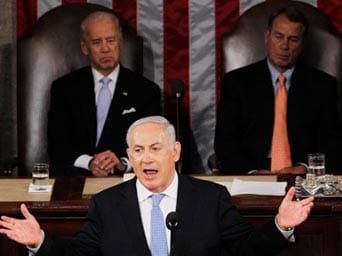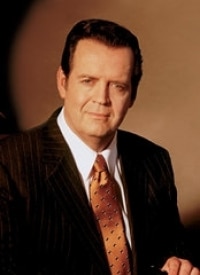 Soon We Will Know if Netanyahu Also Owns Gaza and the UN
Soon We Will Know if Netanyahu Also Owns Gaza and the UN
by James M. Wall
We need look no further than the politics of the state of Israel to see what extremist religion can do with power. The Tea Party in the US, which will determine the winner of the presidential Republican nominating process, is ready to show the world that God wants a final say in US political decision-making.
The Tea Party has emerged as a carbon copy of ultra right wing Zionist forces in Israel. The Tea Party and right-wing political Zionism share a single-minded religious worldview that religious ideology can, and should, exercise absolute control over its citizens.

On June 3-4, at Ralph Reed’s annual Faith and Faithful gathering in Washington, speakers praised God and Israel in equal measure. Only a few weeks had passed since the leader of a foreign nation came to Washington at the request of Congress.
That leader, Benjamin Netanyahu, showed Americans how to combine religious ideology with political power. The peoples’ representatives cheered mightily to demonstrate their loyalty to a foreign nation operating under a religious ideology that served the interests of political power.
Roy Reed invited Republican presidential aspirants to speak to his organization of Christian faithful. Sure, they were also there to talk politics. But their politics are inseparable from their ideological devotion to the modern state of Israel.
Philip Giradi discovered how closely Reed’s speakers adhered to the script of political power and religion.
Support for Israel was on the menu du jour in nearly every speech and for every panel. It dominated the conference. One panel had as its subject “Israel: surrounded yet undaunted in the face of evil.”

Richard Land, president of the Southern Baptist Convention’s oddly named Ethics and Religious Liberty Commission, spoke for fifteen minutes about Israel, saying “If we want God to bless America, then we have to bless the Jews. God gave that land to his chosen people forever. That issue is settled by God almighty…Michele Bachmann produced a standing ovation when she cited a “shocking display of betrayal of our greatest friend and ally Israel.” She added “I stand with Israel…President Obama…does not speak for us on the issue of Israel.”
The Reed gathering was just one of several recent Washington displays of love for Israel. Soon we will know what impact that love will have on two major international events.

The first is the arrival of a flotilla of peace-oriented ships off the coast of Gaza. The second is the September meeting of the United Nations General Assembly where Palestinians will seek admission, as a state, to the UN General Assembly.
The last effort of a flotilla to breach the blockade of Gaza led to the deaths of nine passengers, May 10, 2010. One of the passengers killed by the Israeli military was Furkan Dogan, who held dual Turkish-US citizenship. There was no official American objection to any of the killings, including that of Dogan, who was born in Troy, New York.
One year and one month after the Israeli raid that killed nine passengers in May, 2010, a much larger flotilla sails this week to Gaza.
Ali Abunimah, writing about the flotilla in the Electronic Intifada, was dismayed by Hillary Clinton’s response:
US Secretary of State Hillary Clinton seemed to lay the ground – indeed almost provide a green light – for an Israeli military attack on the upcoming Gaza Freedom Flotilla, which will include the US Boat to Gaza.
Among the passengers aboard the American boat will be 87-year old Kindertransport survivor Hedy Epstein, and author and poet Alice Walker. In all it is expected that about 10 ships, carrying 1000 people from over 20 countries will take part.
Here’s what Clinton said in remarks at the State Department on 23 June:
“Well, we do not believe that the flotilla is a necessary or useful effort to try to assist the people of Gaza. Just this week, the Israeli Government approved a significant commitment to housing in Gaza. There will be construction materials entering Gaza and we think that it’s not helpful for there to be flotillas that try to provoke actions by entering into Israeli waters and creating a situation in which the Israelis have the right to defend themselves.”
Clinton must know that Gaza is not part of what any country recognizes as ‘sovereign’ Israeli territory, and therefore neither are Gaza’s territorial waters. Any boats entering Gaza’s waters would not in fact be entering ‘Israeli waters’ as Clinton claimed.”
Clinton’s attitude toward the flotilla does not portend a favorable US response when Palestinian UN membership comes before the General Assembly in September
If the GA does vote to refer the membership issue to the Security Council, the US will most likely veto the proposal. The US has no veto in the General Assembly, which is why Israel is working feverishly to persuade European Union nations to vote against the proposal in the GA, and to put pressure on smaller nations to vote against it.
Meanwhile, while the flotilla heads to Gaza waters and diplomats face the September vote, Prime Minister Netanyahu holds three trump cards, any one of which would derail any future peace agreement.
First Card: Israel will not negotiate in any forum with a Palestinian government that includes Hamas. Since there can be no Palestinian government that does not include Hamas, negotiations are impossible.
Second Card: Netanyahu insists there can be no “right of return” for Palestinian refugees who wish to move to, or be compensated for, former Palestinian land in what is today the state of Israel. No Palestinian leader could survive as a leader if he or she gives up that right before any final negotiations begin.
The right of the return of refugees is codified in international law. It is also one of those sacred rights symbolized by the keys retained in Palestinian homes wherever Palestinian refugees currently live.
Third Card: Israel will not negotiate with the PA until it recognizes Israel as a “Jewish State”. This is the card Uri Avnery has correctly dismissed as “nonsense”. This demand for a “Jewish state” was not a part of any Palestinian-Israeli negotiation until it was introduced into the conversation in 2007.
Yonatan Touval was a senior policy analyst with the Geneva Initiative, an Israeli nonprofit organization, when he wrote in a New York Times op ed column, May 12, 2009:
While the demand for Palestinian recognition of Israel’s right to exist was unique (after all, it is non-states that customarily seek such recognition from already existing states), the more recent demand that the Palestinians recognize Israel as the Jewish state is dangerous. It must be resisted by those who care about Israel’s long-term strategic interests.
Israel’s leaders had never sought such recognition from any party, friend or foe. The 1979 peace treaty with Egypt, which Begin signed, only expresses mutual recognition of the “sovereignty,” “integrity” and “political independence” of both parties. The peace treaty with Jordan that Yitzhak Rabin concluded in 1994 uses the same language. No mention of Israel’s Jewishness appears in either treaty.
In fact, it was only on the eve of the Annapolis conference in November 2007 that then-Prime Minister Ehud Olmert first trotted out the Jewish card, conditioning his participation on Palestinian recognition of Israel as a Jewish state. Fortunately, the international community did not respond and Olmert abandoned his demand.
Not only is this recent addition to Israel’s demands without precedent in the international community, it also ignores the fact that 1.4 million Palestinian Arabs live as citizens within the boundaries of Israel.
In their book, Israel’s Palestinians: The Conflict Within, Ilan Peleg and Dov Waxman write (page 19):
 All too often, people are completely unaware of the large number of non-Jewish citizens of Israel–around 1.8 million
All too often, people are completely unaware of the large number of non-Jewish citizens of Israel–around 1.8 million
people–who make up a quarter of the country’s total population of 7.5 million. One in four Israelis, in other words, are not Jewish.
The vast majority of this significant non-Jewish population are Arabs, who at the end of 2009 numbered 1,526,000, more than 20 percent of Israel’s population.
Pelig is the Charles A. Dana Professor of Government and Law at Lafayette College and servesas a scholar at the Middle East Institute in Washington, DC., His co-author, Dov Waxman, is associate professor of Political Science at Baruch College and the Graduate Center, City University of New York.
Their book is a rich resource for information on “Israel’s Palestinians”, the designation, by the way, preferred by Palestinian citizens of Israel instead of the official Israeli government terms, “Arab Israelis” or “Israeli Arabs”.
Peleg and Waxman write specifically on the impact that defining Israel as a Jewish state, would have on Israel’s Palestinians. They resist it. According to the authors, “The redefinition of the state has become the central demand of the Palestinian minority [within Israel].”
As the state’s Jewish identity has become a major point of contention domestically, it has also been inserted into the Israeli-Palestinian peace process by Prime Minister Netanyahu’s insistence that the Palestinian Authority officially recognize Israel as a Jewish state in a final peace agreement.
Such recognition, however,is unlikely to be granted against the objections of the Palestinian minority in Israel–underlining the connection that we emphasize in this book between Israel’s external and internal Palestinian problems.
President Obama grew up as a member of a minority community. Existentially, morally, and intellectually, he knows that the rights of a minority must be respected in a democracy, if that democracy ever expects to become “a state for all its citizens”.
See the original article in: Wallwritings
ABOUT JAMES WALL: James Wall is currently a Contributing Editor of The Christian Century magazine, based in Chicago, Illinois. From 1972 through 1999, he was editor and publisher of the Christian Century magazine. He has made more than 20 trips to that region as a journalist, during which he covered such events as Anwar Sadat’s 1977 trip to Jerusalem, and the 2006 Palestinian legislative election. He has interviewed, and written about, journalists, religious leaders, political leaders and private citizens in the region. Jim served for two years on active duty in the US Air Force, and three additional years in the USAF (inactive) reserve. Jim launched his new personal blog Wallwritings, on April 24, 2008. He can be reached at: jameswall8@gmail.com
Read more
ATTENTION READERS
We See The World From All Sides and Want YOU To Be Fully InformedIn fact, intentional disinformation is a disgraceful scourge in media today. So to assuage any possible errant incorrect information posted herein, we strongly encourage you to seek corroboration from other non-VT sources before forming an educated opinion.
About VT - Policies & Disclosures - Comment Policy



